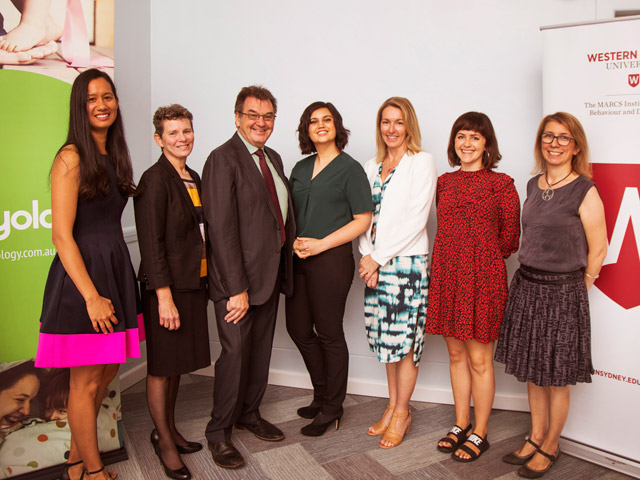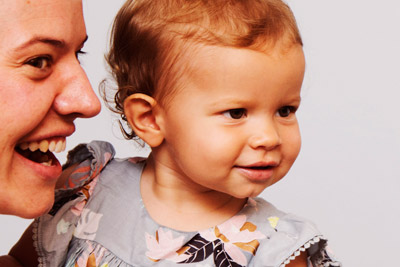BabyLab PodCast Interview

Let's Baby Talk
A new eight-part podcast, BabyLab, has just launched offering Aussies a fascinating insight into the nuts and bolts of how babies learn to talk.
Over the next eight weeks you can join podcast host, Jamila Rizvi and experts from Western Sydney University's MARCS Institute as they discuss a range of fascinating baby language topics. Download and listen to BabyLab now, available on a range of Podcast platforms including iTunes and Google Play.
Interview with Dr Christa Lam-Cassettari, Western Sydney University Infant Researcher and Interim BabyLab Leader
Question: What will parents learn through BabyLab?
Dr Christa Lam-Cassettari: Parents can join Western Sydney University experts over the course of eight episodes to explore the science behind how babies learn to communicate and learn tips and tricks to better understand their child's cognitive and social development.
The podcast will offer parents fascinating insights into the development of their child's speech. Everything from whether 'baby-talk' is the best way to speak to little ones, to the reason behind first words and to the positive effects associated with raising a bilingual baby.
Question: How do babies learn to talk?
Dr Christa Lam-Cassettari: Babies begin learning the rules of language before they are even born. They can hear the rhythm of their mothers voice echoing through her body 3 months before they are born and this influences early brain development. Babies who are immersed in lots of language have been shown to have a bigger vocabulary than peers who hear less language in the first years of life. Our research has also shown that the sing song voice caregivers use, not only attracts infant attention to speech, but also exaggerates the difference between vowel sounds which helps babies learn the difference between speech units.
Question: What are the implications and benefit of speaking 'baby talk' to little ones?
Dr Christa Lam-Cassettari: Put a cute baby in front of someone and almost instantly the "goo goo gaa gaa" talk starts – it's almost impossible to resist! However some parents may question whether baby talk is actually impacting on their baby's ability to learn to talk.
In the new BabyLab podcast we discuss how it's actually really important to chat that way to our babies as it helps with our little one's language development. It also helps to capture our baby's attention when speaking to them, keeps them interested in what we're saying and inspires them to want to be part of the conversation.
 Question: How should we speak to our babies?
Question: How should we speak to our babies? Dr Christa Lam-Cassettari: Research reveals that children of parents who exaggerate their vowels when talking to them (a classic baby talk technique!) are more likely to have better vocabulary at 18 months, so don't stop that baby talk!
Baby talk also helps parents to build a bond with their baby and regulate their baby's emotions. Research shows that the sing song pattern of baby talk and the exaggeration of warm, positive emotion elicits more positive responses (e.g., smiles and babbling sounds) from babies than the flatter speech style used with other adults.
Question: How important is reading books to babies?
Dr Christa Lam-Cassettari: Reading books to babies is very important, as it'll help to encourage little ones to start reading by themselves as soon as they are able to. Here are three top tips for parents thinking about starting to teach their children to read.
Model the process: You can't expect your children to read if you have no interest in reading yourself, so grab yourself a good book and put your feet up with your kids
Teaching the value of reading: You can help your kids understand the value of reading by relating the things they are learning to their everyday life
Critical reading: When your child is reading, sit and read with them and try to help them to critically look at what they are learning and discuss different opinions with them.
Question: What influences a baby's first word?
Dr Christa Lam-Cassettari: It's fun to try and read into why your baby chose that word as their first word to say and question what it means about them! Before they can produce their first words, babies need to learn how to discriminate individual words from what may seem like a continuous barrage of speech. While babies are making sense of words, they are also practising making sounds with their vocal tracts and progress from cries, to speech like babble sounds . Our research shows that the more opportunities a baby has to participate in "conversations" in the first year of life, the bigger their vocabulary is in their second year of life. So a baby's first words tend to be words that they hear regularly like "dada" or "mama" or the name of a sibling or pet.
Question: What other things will listeners learn from the BabyLab Podcast?
Dr Christa Lam-Cassettari: Hosted by Jamila Rizvi, the eight-part series discusses research from Western Sydney University experts in psychology, linguistics, speech and language, and explores topics such as baby talk, bilingualism, learning to read, first words and play.
You can download and listen to BabyLab now, available on a range of Podcast platforms including iTunes, acast and Google Play.
For more information on the Western Sydney University BabyLab visit www.westernsydney.edu.au/babylab.
Interview by Brooke Hunter
MORE



